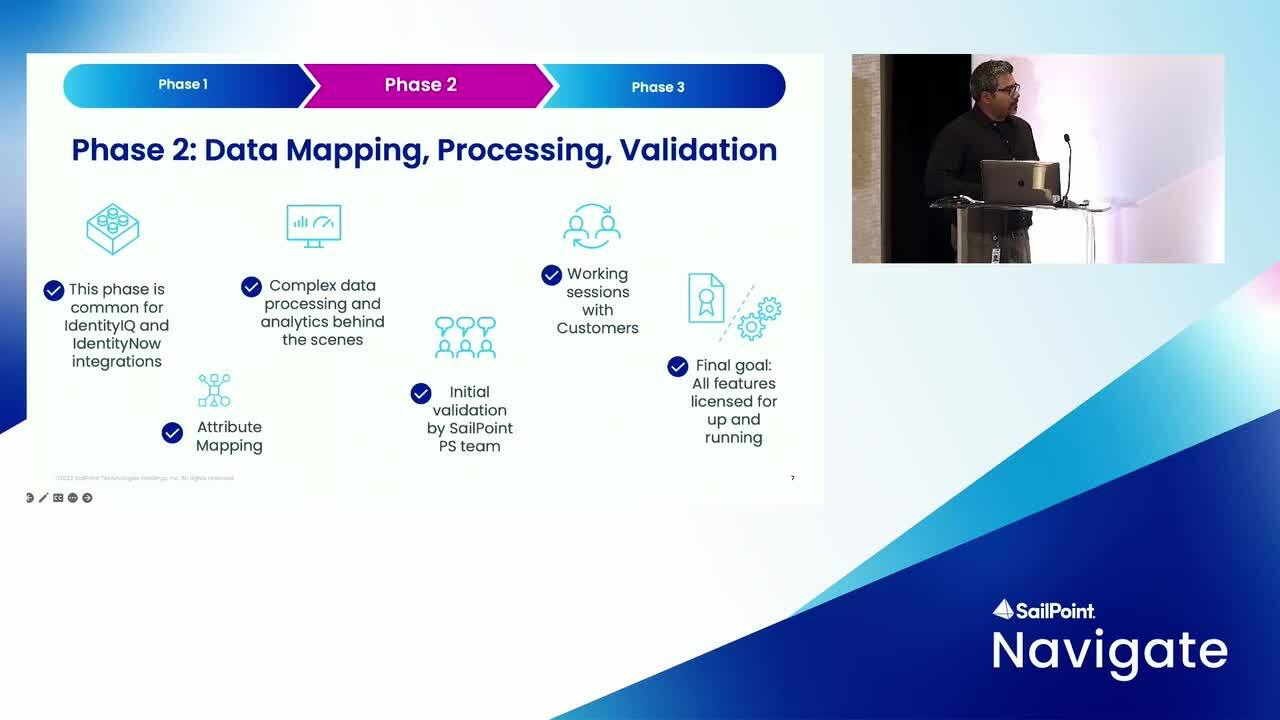In today’s digital world, you can’t do business without technology, and you can’t use technology without identity security.
Identity security (also known as identity governance and identity management) protects against the cyber threats associated with providing technology access to a diverse workforce. It does this by enabling the management and governance of access for every digital identity within an organization.
With the rapid growth of technology in the cloud enterprise, it’s imperative to protect your business against the potential cyber risks that target digital identities.

Learn what to expect during a typical AI-driven Identity Security implementation.
What is a digital identity?
A digital identity is a collection of unique identifiers that helps computing systems identify internal and external users and what they’re permitted to access. These associated identifiers or attributes are recorded and updated throughout their tenure with an organization, keeping permissions and security efforts current. Attributes may consist of email address, login credentials (username/password), pin numbers, etc.
Digital identities are required to enable workers with access to technology. If not managed and governed properly, they and their associated access represents risk to organizations. With hundreds of thousands, even millions of digital identities found across an enterprise organization, enforcing a least-privilege access model for each digital identity is critical to the overall health of a security program.
A recent Identity Defined Security Alliance (IDSA) report showed that 94% of organizations have experienced an identity-related breach, yet surprisingly according to that same report 99% of those breaches were completely preventable.
It’s the aforementioned that shines light on why businesses must be proactive about their approach to identity security. With the digital transformation well underway, organizations need to be able to discover, secure and manage every type of identity—which includes employees, contractors, vendors, customers, and even non-human users such as machines and bots.
Identity security transcends access management
When organizations hear the word identity, they may default to think of access management practices such as single sign-on (SSO) or multi-factor authentication (MFA). However, that’s only part of the identity story.
Authentication helps to verify the identity is who they say they are. However, this practice does not include cross checks to determine if access to resources is allowed and adheres to access policies. Furthermore, SSO and MFA are not able to manage or govern what information within a resource the user is able to see or touch, which is becoming increasingly more important as stricter data privacy regulations are putting more accountability on organizations to protect sensitive information.
Identity security helps solve the bigger picture. It helps to grant, secure, and manage access, working off of the principle of least privilege (PoLP). This is the idea that every single identity in your network only has the least amount of access they need to do their job. Why? By restricting permissions based on job function and user role, you’ll reduce the risk of users having access to information they should not have access to, and inadvertently or maliciously doing something with that information.
Identity security puts an emphasis on both enablement and security—providing access but properly controlling that access. It involves setting up and defining user roles and creating policies used to govern access throughout the digital identity’s lifecycle.
Understanding who requires certain access and being able to modify and remove that access based on role changes is critical for risk and compliance. Defining and enacting access policies are core to identity security. You can’t have technology without access controls.
So, given the paradigm shift in technology, remote work, and cloud initiatives, organizations must evolve and adopt identity security as their overall security strategy.
Identity security for the cloud enterprise
A strong identity security solution helps the enterprise enable access while securing business—everywhere, which includes hybrid and multi-cloud environments, remote work, multiple devices, and more.
Organizations have found that identity security provides multiple layers of business value such as reducing risk and automating IT processes, as well as enhancing the worker experience.
Identity security achieves these above-mentioned results by properly provisioning access, protecting the business at scale, and enabling compliance.
Provision with confidence
By embracing a strong identity security solution, you’ll be able to use artificial intelligence (AI) and machine learning (ML) technology to properly provision and deliver the right access to the right users at the onset of the onboarding process and throughout a user’s lifecycle as they move roles or leave the organization.
Identity security enables you to manage and govern accounts, roles, and entitlements for all applications, systems, data and cloud services, all while maintaining the same level of consistency and visibility across the entire organization. This makes it easy to identify risks, monitor behaviors, and refine roles.
Protect at scale
Ensuring your business maintains operability while managing security is critical when scaling a cloud enterprise. How can you ensure your organization can manage millions of identities and access points while mitigating risk?
Identity security uses deep analytics and machine learning to detect and identify risks, separate duties (SoD) to enforce security controls, and build and enforce custom access policies. Building these policies in turn helps meet compliance needs while maintaining operational efficiencies.
With identity security at the helm, you can manage users, requests and entitlements at high volumes, no matter where you are—without the worry.
Comply with certainty
By governing user access, tracking usage, and enforcing policy controls for all users, apps and data, you’ll be able to demonstrate compliance to auditors.
Identity security ensures regulatory compliance by providing transparency into every digital identity in the enterprise. This includes their attributes, entitlements, and even access history.
With a good identity security solution, you’ll be able to use AI and ML to certify users quickly, maintain audit trails of accounts, entitlements, policies and actions, and manage policies throughout the user lifecycle.
Transforming the enterprise
With SailPoint Identity Security you can transform manual processes to automated, shift your security approach from technology-centric to people-centric, and evolve static policies to be self-learning and adaptive.